Reading Australia: 'The Divine Wind' by Garry Disher
A generation living in peacetime is inclined to devalue the identity and place of soldiers. In Australia, active soldiers have been maligned as meddlesome interlopers in foreign affairs (if they are our soldiers) or combatant terrorists (if they are not). In his book Secret Men’s Business (1998), John Marsden wrote that going to war used to be seen as a marker of adulthood. We forget that war was once how individual personality and collective character was formed. We forget that many of our compatriots came here because of war, that there are former child soldiers living in Australia, and that literature and the armed forces didn’t always occupy such opposing worlds.
The Divine Wind is a war story and an adventure story, but it is told by a protagonist who stays put, right at the centre of a metaphorical and literal cyclone. With his bad leg, all Hart Penrose can do is rotate in circles towards the action, striving for but never quite effecting any of the grandiose deeds he believes will make him a man. His dad is a pearler, his sister a nurse, his friend a soldier. Not only is he stationary in a world swirling with purposeful human activity; but he is also in love with the ‘enemy’ of the time, a woman named Mitsy Sennosuke.
Before readers dismiss our narrator as a swooning Keats relocated to the sweltering antipodes, they need to know he is also a reluctant writer. Such characters make the best literary narrators. They do not have an arsenal of words or know how to be clever with them. They linger over facts and descriptions of places, clutching at emotions, while unintentionally revealing raw truths. Hart’s disability has made him a circumstantial philosopher: he watches and waits, thinks and writes.
Geographically, in the late 1930s and early 1940s, white people felt profoundly isolated and vulnerable in Broome. Their high status was scant consolation when they were vastly outnumbered by coloured people: the Japanese, ‘Malays, Manilamen and Koepangers’, all simmering in a cultural melting pot of increasingly hot days and imminent war. In the 1920s, Broome had around 5,000 inhabitants, only 900 of them white. Broome had segregated cinemas, a Register of Aliens, and a clear but unofficial racial hierarchy. Yet it was also a mythologised place in the literature of the time, which Hart reads with wry scepticism:
According to these stories, no-one knew the sacrifices we made, as we hung on up there, in Unknown Australia, in the Never Never, in the Great Unfenced, before the age of hurry-up. We were the true Australians, in a country going begging, ruled by governments, cities and absentee landlords who knew nothing and cared less about resource development, soil erosion and the teeming threat of Asia, which sat right on our back doorstep, waiting, waiting ...
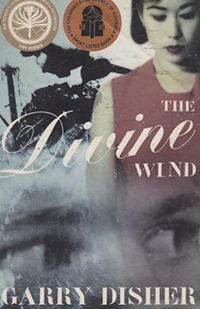 The Divine Wind by Garry Disher (1998, Hodder Headline)
The Divine Wind by Garry Disher (1998, Hodder Headline)
Buy this bookThe characters in The Divine Wind are first and foremost real frontiersmen: from Zeke the pearl diver, with his ascetic face and tough, scarred body, to Derby Boxer, the black stockman; from Mike Penrose with his pearling fleet to Alice Penrose and Mitsy, two young women who venture into cyclones and war zones. Arnold Zable uses the term ‘feral vitality’ to describe survivors of horrors beyond their control, and the reader gets the sense that this hotchpotch of races and cultures was united by their battle against the enemy and the elements. In Broome, the land, sea, and sky can suddenly become sites of death and destruction, especially during wartime.
However, the one group that is treated as if they have no sense of self-agency is the indigenous Australians. Disher spares no sensitivities in recounting the indignities of the past and the cruelty of station owners towards the local indigenous population: ‘Carl didn’t force his recalcitrant black stockmen to dress in women’s clothes and do women’s work. If the blacks got “cheeky” he might dock their wages but never chain them down on a corrugated iron roof ... He didn’t lay on black velvet in the visitor’s quarters, something that some managers did for company men visiting from London.’ But Carl Venning is just as awful in his neglect of the black stockmen.
In 1930s Broome, certain races cooperated to achieve livelihood goals – pearling and farming – in clearly-defined employer–employee relationships. Sometimes, these relationships caused tension when power imbalances were openly acknowledged instead of remaining hidden in servile gratitude. When Alice tells Mitsy to go back to Japan, Mitsy retorts: ‘I would if your father paid my father more.’ Hart observes: ‘That’s what happens between friends, you rub too closely sometimes and the friction ignites the hidden grievances.’ On the whole, the friends remain a close trio; that is, until the Japanese bomb Broome.
From this point on, the novel could have descended into a didactic tale of learning to tolerate difference, of not betraying your friends, of remembering past good deeds – Mitsy’s father once saved Hart’s life after all. But what elevates The Divine Wind from a good yarn to a masterpiece of character development is that Disher doesn’t do this. The poet Robert Cording wrote this about poetry, which could easily be transposed to fiction:
The poem has to feel ... as if there is a real person struggling with real experiences that will not yield some handy lesson, but nevertheless are not entirely without meaning. The voice that convinces will always be the voice of the individual, not as a spokesperson for this or that idea.
Many Young Adult writers get it wrong because of the tyranny of good intentions. In representing refugees or war, they err on the side of righteousness, portraying people of colour as admirable victims, investing them, grudgingly, with as few flaws as possible. With bolder authors like Disher, Marsden, Libby Hathorn, Robin Klein, and James Maloney – and more recently, Clare Atkins – the character comes first. As a prerequisite they have done their extensive research; they are not bumbling around with stereotypes. They also trust their adolescent readers to have a more nuanced understanding of character development than the ‘heroes and villains’ mentality that informs much Young Adult literature. I remember reading Tomorrow, When the War Began (1993) and recognising the character Lee – not because he was Asian, but because he did not ‘do’ Asian-ness. He did survival, as did all of his friends.
Mitsy’s feelings are a mystery to Hart. He doesn’t even know why he loves her. She is not physically beautiful, and she can be bull-headed and unforgiving, a young Asian nurse without the endearing bedside manner usually associated with such caricatures. While washing Hart, she even laughs at his manhood. Yet he still loves her. For long periods she sequesters herself away from Hart, as well as from her best friend, Hart’s sister Alice. When she tells Hart that she must give up nursing because her mother needs her, you get the strong sense that she exists as a separate character outside his own pinings and imaginings.
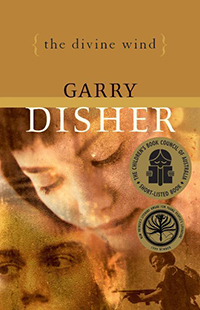 The Divine Wind by Garry Disher (2002, Hachette Childrens Books)
The Divine Wind by Garry Disher (2002, Hachette Childrens Books)
Buy this bookDisher writes that teenage girls initially hate Mitsy because she is ‘cold’ and stony towards the protagonist. He asks them to ‘step outside of [their] skin and into hers, and consider the pressure she’s under’. This important self-interrogation does not happen if minority characters are two-dimensionally easy to love. Mitsy’s Japanese-ness does not define her, but nor does her Australian-ness: ‘Mitsy represented a new generation. Born and educated in Broome.’ Mitsy is described as ‘sly’, but a few pages later Hart also describes his sister Alice as ‘sly.’ Slyness in this case is not synonymous with Orientalism but with commendable survival skills, the formation of the frontier character. Mitsy suffers but is never pitiable. She is defensive, never cruel.
Hart realises that in his powerlessness against circumstance he can be both self-pitying and mean-spirited. Yet his redeeming quality is his acute awareness of his fallibilities: his lack of action, his faltering ways, even his petty resentment of his able-bodied friend, Jamie Kilian: ‘I envied him, I was jealous, I pitied myself. Perhaps that’s why I decided not to go out to the aerodrome with Alice to say goodbye. I didn’t want to witness the bounce in his step.’
It is Jamie, who represents the continuity of the Anzac legend, goes to war, courts Mitsy, and becomes the object of Hart’s envy. When drafting The Divine Wind, Disher came across an account of an Australian army surgeon whose best friend was looking for a way to get them both to safety, but in the end left without telling him. The surgeon ended up as a Japanese prisoner of war. ‘I’d never been impressed by Australians’ fond notions of the national character,’ Disher states, ‘We like to think we’re brave, resourceful, loyal to our mates, democratic, egalitarian ... and here was a betrayal of mateship ... It was a powerful betrayal.’
As racial tensions escalate in Broome, so do Hart’s feelings towards Mitsy:
How can you love and hate someone at the same time? How can you continue to want them, and yet despise them? It has happened to all of us, yet when it first happens there is nothing more hurtful and confusing ... we are ... the worst of ourselves, the side we’re scarcely aware of.
With deceptively simple sentences replete with feeling, Hart reflects that even when Derby Boxer tells Hart and his father that they were good people, ‘I didn’t feel that there was much goodness in me.’ This is the mark of a character who understands morality beyond the simple accumulation of good or bad deeds, a young man with a deep understanding of how powerless the individual can be against circumstance.
Perhaps Hart’s feelings are conflicted because he is also struggling with an underlying and unacknowledged resentment of Mitsy’s defiance in the face of adversity. When the police and soldiers come, she refuses to let them look in her house, even though she has nothing to hide. When the Japanese bomb Broome, she declares: ‘We need to get down to the harbour. There’ll be people in the water, people dying.’ She ventures onto the beach to put her nursing training to good use, despite racist hostility and impending internment. Like her friend Alice, she does what is right, not what is easy.
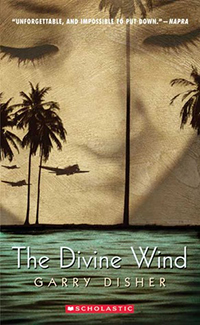 The Divine Wind by Garry Disher (2004, Scholastic Paperbacks)
The Divine Wind by Garry Disher (2004, Scholastic Paperbacks)
Buy this bookYet Hart’s admiration of Mitsy is clear, as he joins her in the search and rescue in the most powerful chapter of the book, ‘The Divine Wind’. Hart comes to a reckoning of all that he is and what he will become. He defines Mitsy for all of us, once and for all, when he grabs and yells at the harbour master who is denying her the medical kit to save lives: ‘Don’t be so stupid. She’s a nurse. She’s lived here all her life, you useless bastard.’
Nonetheless, our narrator is not a straightforward hero. He may have saved lives, but in a pivotal scene he briefly reveals a decision he might have made that would have had no consequences for anyone other than the victim, himself, and his own conscience. For once, Hart does not do what comes easily. He does what is right. In the end, Hart learns to abandon his self-absorption and to accept patience. He thinks about his mother and realises that ‘she understood what it is to wait for something to change, just as I’m waiting now, waiting for Mitsy to come back to me’.
Garry Disher writes that he is proud of the powerful opening lines of his book, but for me the ending remains more resonant, almost two decades later. It is not a neat conclusion; some publishers today might ask him to change such a final sentence, to make it less depressing. Yet the reality is that war is depressing, self-abnegating, and destructive. People don’t just turn into their better selves because of adversity. It is a choice, and sometimes suffering does not make a person stronger. The concluding paragraph was a culmination of Hart’s character and resilience; and I feel vindicated by Disher’s own explanation of his ending:
He’s not going to back away. It’s not a dramatic or heroic reversal, but quietly hopeful. He says, ‘We may not make it,’ meaning he knows the terrible pressures he faces now, in post-war Australia, but is willing to give it a go.
Referenced works:
Secret Men's Business, Manhood: The big gig (1998) by John Marsden, Pan Macmillan
Tomorrow, When the War Began (1993) by John Marsden, Pan Macmillan







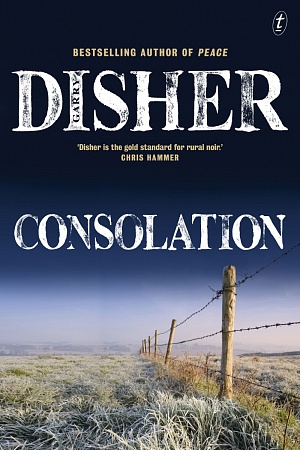
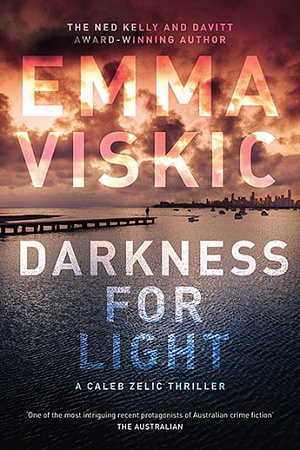
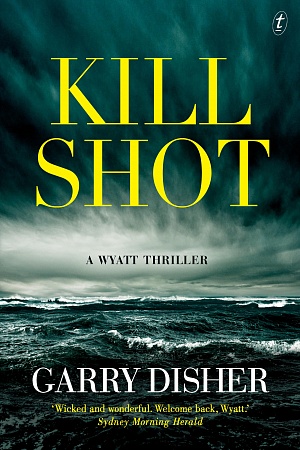
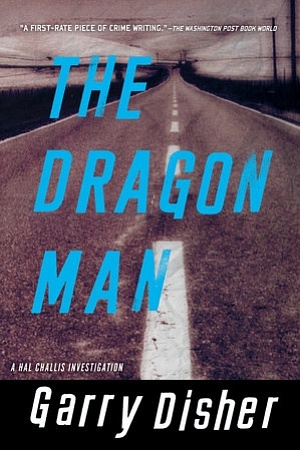
Leave a comment
If you are an ABR subscriber, you will need to sign in to post a comment.
If you have forgotten your sign in details, or if you receive an error message when trying to submit your comment, please email your comment (and the name of the article to which it relates) to ABR Comments. We will review your comment and, subject to approval, we will post it under your name.
Please note that all comments must be approved by ABR and comply with our Terms & Conditions.